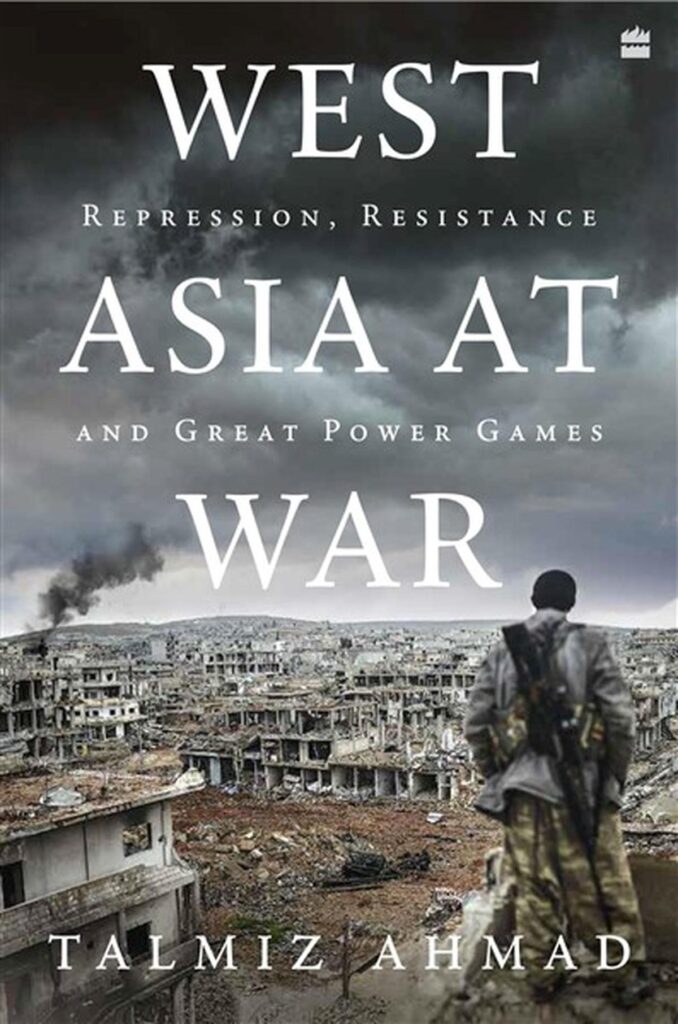INDIA :

A veteran diplomat Talmiz Ahmad provides a rare non-Western narrative of complex undercurrents in West Asia, where inequality, politics over oil and regional rivalries are fuelling tensions
West Asia is a strategically critical region faced with confrontation and conflict amid growing economic prosperity. In his latest book, West Asia at War, Talmiz Ahmad, a former ambassador, brings out the diverse political, religious, military, socio-economic and cultural forces shaping the region. His long diplomatic career with postings there and wide-angled view from the headquarters gave him uncommon insights, which he pieces together in this book providing a rare non-Western view of complex undercurrents.
The exhaustive work traces the origins of the troubled region to the 17th century when Britain and France fiercely fought with each other over resources and zealously guarded their colonial empires. The new states that emerged in the wake of the Ottoman Empire’s fall also fell prey to this contestation. The discovery of large quantities of hydrocarbons at the beginning of the 20th century proved to be the region’s nemesis as it exposed it to outside competition and a rivalry between superpowers.
Internal bickering
Ahmad elaborates on the rise of Arab nationalism after World War II, tracing developments leading to the nationalisation of the Suez Canal by Gamal Abdel Nasser.
He explains how regional rivalries destroyed West Asia from within. The two major Arab powers, Egypt and Saudi Arabia, representing different ideological trends — revolutionary and conservative — played against each other. Further, the Saudi-Iran rivalry deepened Sunni-Shia hostilities. In a bid to fortify its standing in the region, Saudi Arabia’s call for ‘global jihad’ unwittingly propped up Osama bin Laden and Mullah Omar, with disastrous consequences. The Palestine cause unified the Arab world, but the constant internal bickering and feuding weakened their collective resolve for Palestine.
Gulf monarchies and the Muslim Brotherhood fiercely competed for the domination of political Islam. The massive oil revenues strengthened authoritarian regimes, whose economic control often conflated with people’s livelihood issues. With about 66% of 400 million Arabs redundantly poor and 10% controlling 61% of the wealth, the region is one of the most unequal in the world. Beyond the dazzle of Dubai, Doha and Riyadh, the author observes, is pervasive poverty, inequality and injustice that are alienating people and making them susceptible to fundamentalism, drugs, terrorism and extremism, further fuelling tensions within.
Ahmad rips apart the U.S. policy towards West Asia that is anchored in the influential ‘Israeli lobby’. Its twin objectives of securing oil flows and guaranteeing the security of Israel at the cost of Iran are deeply flawed and the much-maligned Iraqi WMD (weapons of mass destruction) programme is grossly exaggerated, he writes. The causal linkage to 9/11 and the injustice meted out to Palestine by Israel, backed by the U.S., are two examples of short-sighted policies which led to Islamophobia and fomented the fictitious idea of a ‘clash of civilisations’ as a living reality in the West.
India’s stand
The evolution of India’s policy towards West Asia is put in context by Ahmad. India’s leadership viewed the Palestine issue and the Suez crisis within the framework of the Arab nationalist struggle against British imperialism. Their common commitment to liberation movements drew them naturally to the Non-Aligned Movement. However, some perceptible changes in the approach in the last two decades stem from India’s newfound confidence as an emerging economy with the ability to buy large supplies of Gulf oil. India’s de-hyphenation of its relations between Palestine and Israel is pragmatic as well as in sync with the changing dynamics in the region. Closer ties with Israel also brought India the backing of the U.S. on several fronts. The strategic depth that our relations attained is attributed to Prime Minister Narendra Modi, who took a personal interest through frequent travels to the region to build solid economic partnerships as well as to secure the interests of our strong resident community.
The ongoing geo-political churn in the region is insightfully covered. Bahrain, Sudan, Morocco and the UAE seeking cautious normalisation of relations with Israel would have a salutary effect on both the regional stability and the survival of Israel. The realisation that Israel’s subversive activities against Iran could neither effect regime change nor completely disrupt its nuclear programme should prompt a dialogue between them.
The Shia-Sunni sectarian binary used for mobilising hostility and rancour is also losing steam. This apart, the author underlines that the prospect of a stable and prosperous West Asia is contingent on real internal reform that goes beyond optics and palliatives.
The perception that disengagement of the U.S. from the affairs of the region would have significant implications for itself and the security of West Asia is indisputable. China-Russia working in tandem and Iran-Turkey aligning their positions pose a serious challenge to U.S. hegemony in the region.
All Gulf countries have upgraded their economic relations with China. Ahmad underscores the point that while India is a natural partner of many in the region, it needs to be diplomatically agile to manage the challenges arising out of these new alignments in West Asia.
West Asia at War; Talmiz Ahmad, HarperCollins, ₹799.
The reviewer is an Indian Foreign Service Officer.
source: http://www.thehindu.com / The Hindu / Home> Books> Reviews> Politics / byDammu Ravi / July 23rd, 2022








